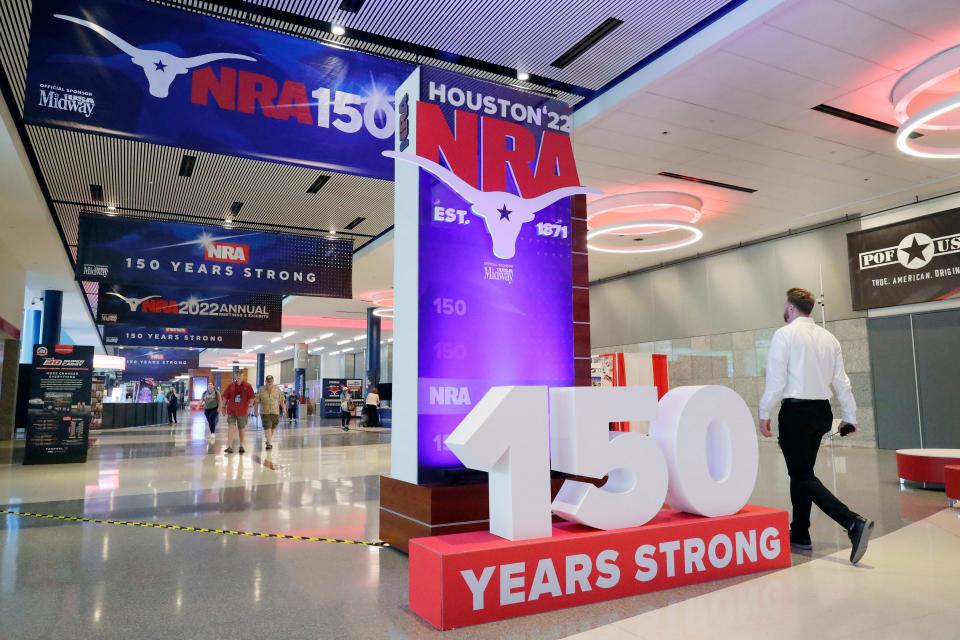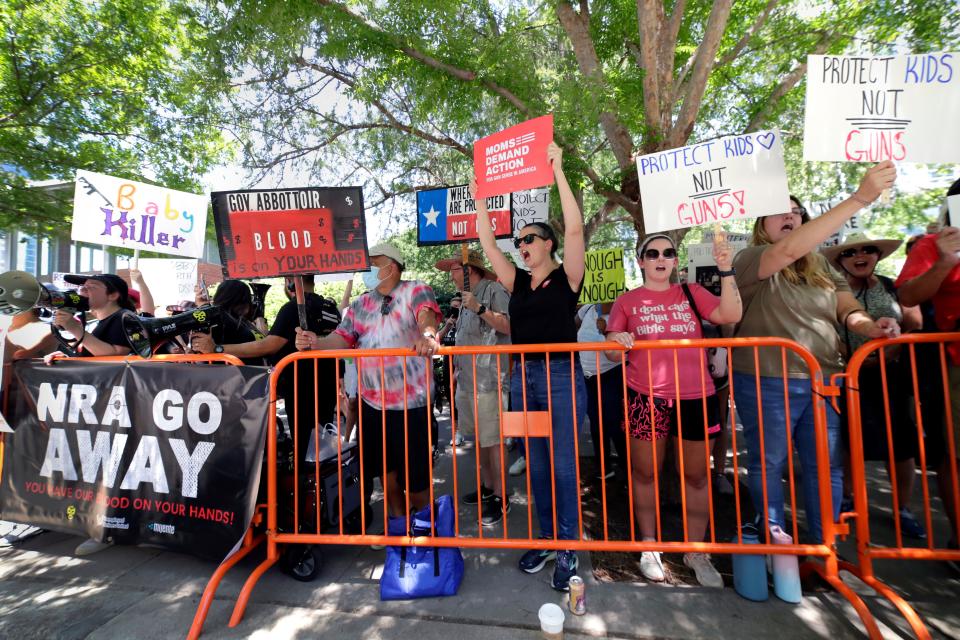Briggs: Our system is too broken to stop mass shootings
The 19 children and two teachers who died because they were inside a Texas elementary school are sacrifices to America’s gun ownership dogma.
They are not the latest. There have been more victims since Uvalde, Texas, in cities and towns across America, including a mother who died Thursday in a southside Indianapolis apartment. The annihilation never ceases. It proceeds under the radar, and in marginalized communities, day in and day out. We accept it. We permit it. We choose to let it happen.
When I say “we,” I mean red states such as Indiana, which hold all the power on this issue and treat gun ownership as an entitlement. Because the Senate favors geography over people and because the filibuster rule requires at least 60 senators to agree on legislation and because the Democratic majority refuses to eliminate that rule and because the House is split among districts with extreme partisan leans, our political system is responsive to the most conservative voters, even as the vast majority of Americans want stricter gun rules.

A Politico/Morning Consult poll found strong support for background checks on all gun sales, a national database with information about each transaction, a ban on assault-style weapons, a ban on sales to people known to law enforcement as possibly dangerous due to mental health conditions and a requirement for owners to keep firearms in safe storage units.
These views are as static as the resistance among elected officials, mostly Republicans, to act on them. Even as most Americans are furious and desperate for solutions, Republicans are incentivized to cater to the minority who want virtually no rules or regulations on firearms.
School shootings, per se, are not enough to cast doubt on America’s gun culture. There have been 27 school shootings already this year, according to Education Week, and some 900 incidents involving gunfire at schools in the decade since Sandy Hook. How many do you remember?
The rounds of Do Somethingism that renew our commitment to doing nothing have become cliche — and, yet, even brief introspection is not so automatic as it seems. It takes a high body count, with a horrific narrative, to arrest our attention long enough to look in the mirror. It takes a shooting on the scale of Uvalde.
When it happens, every few weeks or months, these recurring slaughters separate us into two camps. The first acknowledges that mass carnage is horrible and sad, yet also insists it is a cost of living in America, where we value gun ownership as an essential right, so there is no solution.
‘We can’t stop bad people’
Texas Attorney General Ken Paxton spoke for this camp in a television interview. “We can’t stop bad people from doing bad things,” Paxton said. “They’re going to violate murder laws. They’re not going to follow gun laws.”
It is common among people in the first camp to agree that something should be done, so long as it has nothing to do with guns. Media Matters for America, a leftist media tracker, compiled a list of 50 suggestions discussed on Fox News last week, none of which included restrictions on guns. The problem, according to the first camp, is mental health or a lack of church attendance or schools with easy access and unarmed teachers.

I won’t go down the rabbit hole of addressing alternative explanations. It is not necessary. When you compare America to other nations, which do not experience this problem, the differences are clear. America has vastly more shootings than other countries because its citizens own vastly more guns than those in other countries.
You can talk about how anyone bent on violence will find a way to kill. Maybe. But, if the Uvalde shooter had attempted his assault without access to firearms, it would have played out much differently. Police would not have waited 45 minutes to enter the classroom where children were slain if the killer had wielded a knife rather than an AR-15-style rifle.
It is beyond silly to argue that the instrument of violence is irrelevant to those motivated to kill. There is a reason that firearms have been a primary tool of war since the 16th century: Even when guns were bad, they were better at killing people than whatever else armies had laying around.
Now, the guns are very, very good.
Republicans have no incentive to act
The second camp, furious at the first, argues that we should add restrictions on gun ownership because enabling citizens to stockpile firearms without rules or oversight does not provide any societal benefits to offset tens of thousands of gun deaths per year.
There are Republicans who sympathize with this camp, yet are so overpowered by the forces I described above — particularly, the need to appeal to the most conservative voters on gun rights or get blown out in primaries — that they silo themselves in the first. Gun culture is part of the conservative political identity and support for new restrictions is not tolerated among red districts and states.
The New York Times asked all 50 Senate Republicans whether they would support House-passed strengthened background checks on gun buyers. Indiana Sens. Mike Braun and Todd Young were among the majority in the “declined to answer or deflected” category.

I asked a former Republican congressman, who had expressed an openness to stricter background checks after Sandy Hook, whether a Republican planning to run for re-election today can afford to give ground on gun restrictions.
“We are in a more performative era in politics,” he said. “Too many members get rewarded for speechifying rather than legislating.”
That incentive structure produces the persona of U.S. Rep. Jim Banks, who has spent the past week posturing and carrying out a feud on the radio and on Twitter with Drew Anderson, the communications director for the Indiana Democratic Party. Banks’ 3rd District seat is safe, so there is no pressure on him to engage in serious policy discussions. His reward is in clownishness.
The sheer hopelessness of addressing gun violence in this climate pushes the second camp into counterproductive directions: screaming into the void online, which, while perhaps cathartic, does nothing to advance the goal, and lowering the bar to expend massive political energy on legislation that wouldn’t make much of a difference.
When mass shootings occur, elected officials haggle over background checks, bump stocks and red flag laws — and, then, nothing happens, except that guns get easier to buy and carry in red states such as Indiana. It feels good to talk about nuances in gun policy because it preserves the illusion that a bipartisan deal — progress! — is ever around the corner. It’s also just depressing to admit that America trades children’s lives for free-flowing retail gun markets.
In the wake of the Texas shooting, there has been another public debate over putting restrictions on AR-15-type rifles, such as those purchased by the Texas shooter. But most mass shootings involve handguns, for which Indiana lawmakers recently eliminated permit requirements against the wishes of law enforcement. To the extent that a bipartisan deal is within reach, it would probably be so weak as to prove the point of people in the first camp: Killers are going to kill.
This is uniquely American
In theory, this impasse is not unbreakable. It might have surprised America’s founders to foresee that we would have chained ourselves to their documents as an excuse to let killers carve paths through captive victims in schools and warehouses and retailers. Thomas Jefferson, writing to James Madison in 1789, mused that every generation might create its own constitution.
“It may be proved that no society can make a perpetual constitution, or even a perpetual law,” Jefferson said. “The earth belongs always to the living generation.”
It is a choice to not alter the constitution; it is a choice to appoint Supreme Court justices who interpret the Second Amendment as permitting private ownership of weapons that terrify police into paralysis; it is a choice to not pass laws that restrict gun ownership within the confines of that interpretation and it is a choice for Republicans to pursue opportunism over solutions.
These choices are so entrenched, though, that it’s impossible to envision the means of reversing them. As recently as a couple months ago, Indiana passed legislation to eliminate the permit requirement for handguns. The basic weapon used in most mass shootings will soon be easier to carry in Indiana.
Gov. Eric Holcomb last week took the Uvalde slaughter as evidence for the need to improve school security. He expressed no regrets about Indiana’s soon-to-take-effect law on handguns, which he signed.
"We're not going to, I believe, in the state of Indiana take steps to restrict individuals who lawfully can purchase a gun for sport or defense for themselves,” he said in response to a reporter’s question. “I just think that's contrary to the United States constitution, quite frankly."
That deference to gun culture at the expense of innocent lives is a uniquely American response. Other countries have reacted differently and proven that solutions are possible.
Germany experienced horrific school shootings in 2002 and 2009, which resulted in a combined 31 victims. The country responded by requiring anyone younger than 25 to pass a psychiatric exam before applying for a gun license, according to The Los Angeles Times. Anyone who wants to buy a gun must also wait a full year, pass a test and provide an acceptable reason for owning a gun. As of 2016, the gun death rate in Germany was 0.9 per 100,000 people, compared with 10.6 in America.
Australia, a pretty conservative country, took drastic measures in the wake of a 1996 shooting that killed 35 people. The country made gun ownership a privilege instead of a right, banned semi-automatic weapons, initiated a gun buyback program that took as many as one-third of the nation’s firearms out of circulation and created a gun registry. Applicants for gun licenses, like in Germany, have to provide a reason for wanting a gun.
Australians seem happy with the measures, which have drastically reduced suicides and likely lowered homicides. The country has only had one mass shooting (in 2018) since it passed strict gun control measures. Australia (population 26 million) had 278 homicides from mid-2019 to mid-2020 while the city of Indianapolis (population 869,000) had 215 criminal homicides in 2020.
That is the other, more persistent side of gun deaths in America. The isolated murders that get little attention. As Indianapolis and other U.S. cities have struggled through record-breaking homicides in recent years, The Wall Street Journal reports that stolen guns are becoming a major factor in urban violence, with big cities experiencing a 29% rise in reports of firearm theft. Those stolen guns often get used in violent crimes.
You might suggest cities do something about that. In Indianapolis, the City-County Council tried in 2015, passing a proposal that would have required gun owners to report lost or stolen firearms within 48 hours after realizing they had disappeared or face a $50 fine. Getting a handle on stolen guns is the least, and perhaps also the most, cities can do about firearms without state and federal assistance.
Greg Ballard, the former Republican mayor, vetoed it. His reason: “This proposal is contrary to state law."
Contact IndyStar metro columnist James Briggs at 317-444-6307. Follow him on Twitter: @JamesEBriggs.
This article originally appeared on Indianapolis Star: School shooting in Texas won't lead to gun control

